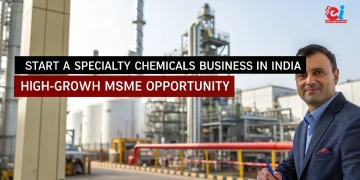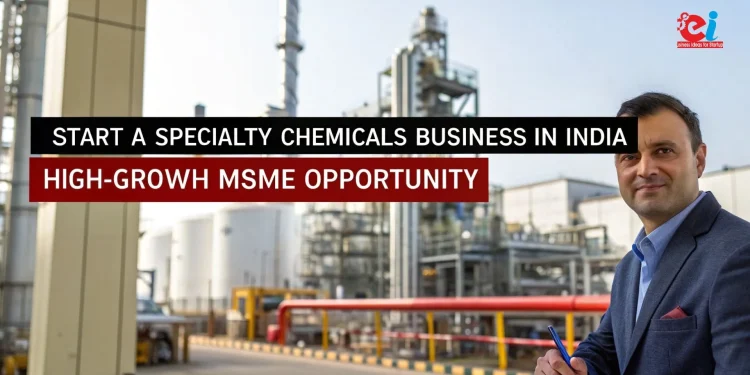The boom in specialty chemicals manufacturing in India has undergone a transformation owing to the realignments in the global supply chains, industrialization, and increasing mindfulness on economic, social, and governance (ESG) requirements. As reported in Chemical Weekly dated June 3, 2025, the domestic firms are increasing their production capacities for high value margin chemical products serving the agrochemicals, personal care, construction, textiles, and electronics value added industries. This boom has tremendously increased the opportunities for self-employment and is chasing the dreams of most MSMEs looking for fast and inexpensive avenues in specialty manufacturing.
What are Specialty Chemicals manufacturing?
Specialty chemicals Manufacturing are defined as specific value adding value added chemical products which, in comparison to bulk chemicals, commanded lower volumes and are oftentimes customer specific. They include:
- Active and intermediate agrochemicals
- Surfactants and emulsifiers
- Coating and construction chemicals
- Processing aids and dyes for textiles
- Active and non-active ingredients for cosmetics
- Chemicals and solvents for electronic grade
- Chemicals oil field water treatment
Related: Building a Skilled Workforce for Specialty Chemical Manufacturing
Why MSMEs Should Focus on Specialty Chemicals
- Target Commodity Chemicals: Established specialty chemicals firms ramps up to 2–5 times higher profits compared to ordinary commodities.
- Easier to Start Up: Most can be gained under 10 crore with MSME terms.
- Customization Capabilities: They are agile enough to adopt narrow and unique bespoke B2B focuses.
- Import Substitution: There is scope for local manufacturing as many of the performance and intermediate chemicals are still imported.
- Export Potential: India’s exports of specialty chemicals was $13.9 billion in FY2024–25 and is expected to grow at a CAGR of 12% over the coming years.
Niche Segments with Startup Potential
1. Construction Chemicals
- Products: Admixtures, curing compounds, bonding agents, sealants
- Market Size: In India, the market is forecasted to be $2.5 billion by 2027
- Startup Scope: Infrastructure developers and RMC plant suppliers
- Innovation: Create polymer modified or bio-based admixtures
2. Textile Processing Chemicals
- Products: Dye fixers, silicone softeners, enzymatic scouring agents, silicone softeners
- Drivers: Increased need for low water use and eco-friendly dyes and finishes
- Startup Scope: Supplying to clusters in Tiruppur, Ludhiana, and Surat
- Opportunity: Development of green formulations and eco-certification
3. Agrochemical Intermediates and Actives
- Focus: Herbicide and fungicides intermediates such as 2,4-D acid, triazoles, chlorinated aromatics
- Drivers: Expansion of agricultural products exported from India and the need for domestically manufactured products
- Scope: Backward integration with large agrochemical firms or toll manufacturing
- Incentives: These are eligible under the PLI scheme of the government
4. Ingredients of Personal Care and Cosmetics
- Products: Emulsifiers, UV filters, thickeners, surfactants
- Trends: Clean beauty and sulfate free formulations
- Opportunity: Production of green surfactants such as decyl and lauryl glucosides
- MSME Benefit: Low investment brand partnership and local batch reactors
5. Water Treatment Chemicals
- Market Size: ₹8,000 crore in India
- Products: Coagulants, scale inhibitors, biocides, and reverse osmosis antiscalants
- Startup Edge: Serving municipal STPs and industrial clients
- Innovation Angle: Creation of biodegradable antiscalants
6. Paint and Coating Additives
The provided text seems to fit into the framework of an anonymous document. The document touches on various topics ranging from proprietary recipes provided for construction and paint industries to the workings of specialized chemical factories. This document also encourages market competition in developing local immigration and spending policies.
Includes:
- Dispersants
- Defoamers
- Modifiers
- Rheology modifiers
- Anti-Microbial Additives
An Emerging Trend
Systems with low volatile organic compounds, or “VOC” emitters, as well as those that use water as the primary solvent, appear to be popular.
7. Electronic Grade Chemicals
Electronics require ultrapure solutions (solvents), as well as etchants, developers, and other personalized fillers for PCBs or semiconductor fabs.
Niche Market
- Isopropyl Alcohol
- TMAH
- Hydrogen Peroxide
- Ammonium Persulfate
MSME Opportunities
Client attraction within EMS and electronics park offers support.
Subsidies at the state-level power and land investments alongside green technology spending
Related: What Is the Future Outlook for the Indian Speciality Chemical Industry
Obstacles and Solutions
- Compliance with precise quality standards — Establish strong QC and documentation procedures early on
- Volatility in the pricing of raw materials — Look into long-term purchasing agreements and backward integration strategies
- Meeting regulations — Hire faster third-party consultants for certification
- Restrictions on entering new markets — Collaborate with industrial clusters and OEMs
Renewable Outlook
- India’s target mark for the specialty chemicals manufacturing will reach $70 billion by 2030
- In 2025, over 250 global chemical purchasers are buying Indian-parent partners
- Import substitution and green formulations will drive MSME growth
- Precision governance, AI, and automation dynamism will enable brace free scaling of MSMEs
Final Thoughts
India’s drone specialty chemicals manufacturing will be boom in the market and be here for the long haul, and the boom of MSMEs will rapidly increase along with its growth. Startups have opportune prospects in profitable export-focused businesses with the support of the government and expanding domestic consumption.
It’s the perfect time for entrepreneurs to redefine Indian manufacturing by adopting niche formulations, keeping quality control, and maintaining agility.
About NPCS
NPCS gives entrepreneurs Detailed Project Reports (DPRs) along with Market Research and Techno-Economic Feasibility Studies based. NPCS offers specialized assistance in business strategy, planning, plant establishment, funding, and project financing—NPCS empowers MSMEs to transform opportunities into successful ventures.


















